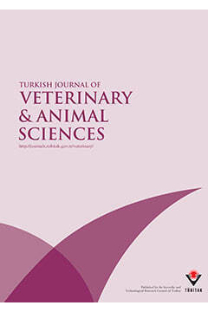The Effects of Rations Containing Different Amounts of Common Vetch Seed on Growth Performance, Digestibility and Some Blood and Rumen Metabolites in Male Lambs
This study consisted of two experiments. In the first experiment, the effects of concentrate feeds containing different amounts of common vetch seed (Vicia sativa L.) on fattening performance, digestibility and some blood and rumen parameters of weaned lambs were investigated. In the second experiment, rumen degradability characteristics of dry matter, organic matter, crude protein for vetch seed were studied in ruminally cannulated mature merino rams in different periods with the nylon bag technique. In the first experiment, 24 Karaman x Dorset Down Gİ crossbreed male lambs aged 2.5-3 months and weighing on average 22.5 kg were used. They were divided into one control and three treatment groups each containing six lambs and they were housed in individual pens. The lambs were fed ad libitum with 87 % concentrate feeds and 13 % barley straw. The common vetch was added to the concentrate feeds at levels of 0, 10, 20 and 30 %. The experiment lasted 105 days, of which 21 days were the preexperimental and 84 days the experimental period. There were no statistical differences in the values of growth performance, digestibility of dry matter, organic matter and crude protein among the experimental groups (p>0.05). During the experiment, the total dry matter intake per kg live weight gain was 5.24 kg in the control group and 5.42, 5.93 and 5.70 kg in groups 1, 2 and 3, respectively (p>0.05). Total protein, cholesterol and lipid levels of blood samples and pH, total VFA and NH 3 -N levels of rumen fluid were not different among groups (p>0.05). In the second experiment maximum potential degradability values of dry matter, organic matter and crude protein for vetch seed were found to be 96.37, 96.70 and 99.14 %, respectively using three adult rumen fistulated merino rams. In conclusion, the usage of 30 % of vetch seed in concentrate feed of lambs did not adversely affect performance, digestibility, rumen degradability characteristics or some blood and ruminal metabolites.
Anahtar Kelimeler:
Lamb, common vetch, growth performance, digestibility, blood and rumen metabolites.
The Effects of Rations Containing Different Amounts of Common Vetch Seed on Growth Performance, Digestibility and Some Blood and Rumen Metabolites in Male Lambs
This study consisted of two experiments. In the first experiment, the effects of concentrate feeds containing different amounts of common vetch seed (Vicia sativa L.) on fattening performance, digestibility and some blood and rumen parameters of weaned lambs were investigated. In the second experiment, rumen degradability characteristics of dry matter, organic matter, crude protein for vetch seed were studied in ruminally cannulated mature merino rams in different periods with the nylon bag technique. In the first experiment, 24 Karaman x Dorset Down Gİ crossbreed male lambs aged 2.5-3 months and weighing on average 22.5 kg were used. They were divided into one control and three treatment groups each containing six lambs and they were housed in individual pens. The lambs were fed ad libitum with 87 % concentrate feeds and 13 % barley straw. The common vetch was added to the concentrate feeds at levels of 0, 10, 20 and 30 %. The experiment lasted 105 days, of which 21 days were the preexperimental and 84 days the experimental period. There were no statistical differences in the values of growth performance, digestibility of dry matter, organic matter and crude protein among the experimental groups (p>0.05). During the experiment, the total dry matter intake per kg live weight gain was 5.24 kg in the control group and 5.42, 5.93 and 5.70 kg in groups 1, 2 and 3, respectively (p>0.05). Total protein, cholesterol and lipid levels of blood samples and pH, total VFA and NH 3 -N levels of rumen fluid were not different among groups (p>0.05). In the second experiment maximum potential degradability values of dry matter, organic matter and crude protein for vetch seed were found to be 96.37, 96.70 and 99.14 %, respectively using three adult rumen fistulated merino rams. In conclusion, the usage of 30 % of vetch seed in concentrate feed of lambs did not adversely affect performance, digestibility, rumen degradability characteristics or some blood and ruminal metabolites.
Keywords:
Lamb, common vetch, growth performance, digestibility, blood and rumen metabolites.,
- ISSN: 1300-0128
- Yayın Aralığı: Yılda 6 Sayı
- Yayıncı: TÜBİTAK
Sayıdaki Diğer Makaleler
Isolation and Identification of Motile Aeromonasspp. in Ground Beef
Özlem KÜPLÜLÜ, Belgin SARIMEHMETOĞLU
Elazığ' da bir keçide gözlenen ilk paratüberküloz olgusunda patolojik bulgular
Erkan KARADAŞ, Nursel METİN, İhsan YAMAN
Determination of Prevalence of Paratuberculosis in Dairy Cattle by Polymerase Chain Reaction (PCR)
Burhan ÇETİNKAYA, Adile MUZ, H. Basri ERTAŞ, Hasan ÖNGÖR, İ. Yavuz SEZEN, H. Basri GÜLCÜ
Tarık BİLAL, Abdulkadir UYSAL, Yücel MERAL, Abdullah KAYAR
A Morphological Investigation of the Postnatal Development of the Syrinx in the Quail
Sığır kıymalarından hareketli Aeromonas türlerinin izolasyon ve identifikasyonu
Özlem KÜPLÜLÜ, Aylin KASIMOĞLU, Belgin SARIMEHMETOĞLU
